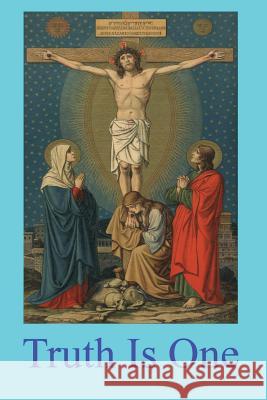Truth Is One » książka
Truth Is One
ISBN-13: 9781533427618 / Angielski / Miękka / 2016 / 106 str.
This was originally written and published as an ebook in early 2005. One person wrote the original draft and three people edited it before final publication. The latter have asked not to be named to remain humble, although it was offered to them to include their names. This ebook was downloaded thousands of times with the request to make any necessary corrections. Over the years, two corrections were offered and made. Both were technical issues. One was a mistake in a footnote, the other a missing phrase from a prayer. No one has offered a substantial correction to this work. The only additions being made are this introduction, the complete article from Robert G. Ingersoll on the statement Truth Is One, Error Is Many, and a conclusion at the end. The balance remains unchanged with the exception of reformatting to a book format. From Robert Ingersoll: Question. How do you answer the argument, or the fact, that the church is constantly increasing, and that there are now four hundred millions of Christians? Answer. That is what I call the argument of numbers. If that argument is good now, it was always good. If Christians were at any time in the minority, then, according to this argument, Christianity was wrong. Every religion that has succeeded has appealed to the argument of numbers. There was a time when Buddhism was in a majority. Buddha not only had, but has more followers then Christ. Success is not a demonstration. Mohammed was a success, and a success from the commencement. Upon a thousand fields he was victor. Of the scattered tribes of the desert, he made a nation, and this nation took the fairest part of Europe from the followers of the cross. In the history of the world, the success of Mohammed is unparalleled, but this success does not establish that he was the prophet of God. Christians claim that success is a test of truth. Has any church succeeded as well as the Catholic? Was the tragedy of the Garden of Eden a success? Who succeeded there? The last best thought is not a success, if you mean that only that is a success which has succeeded, and if you mean by succeeding, that it has won the assent of the majority. Besides there is no time fixed for the test. Is that true which succeeds to-day, or next year, or in the next century? Once the Copernican system was not a success. There is no time fixed. The result is that we have to wait. A thing to exist at all has to be, to a certain extent, a success. A thing cannot even die without having been a success. It certainly succeeded enough to have life. Presbyterians should remember, while arguing the majority argument, and the success argument, that there are far more Catholics than Protestants, and that the Catholics can give a longer list of distinguished names. My answer to all this, however, is that the history of the world shows that ignorance has always been in the majority. There is one right road; numberless paths that are wrong. Truth is one; error is many. When a great truth has been discovered, one man has pitted himself against the world. A few think; the many believe. The few lead; the many follow. The light of the new day, as it looks over the window sill of the east, falls at first on only one forehead.
Zawartość książki może nie spełniać oczekiwań – reklamacje nie obejmują treści, która mogła nie być redakcyjnie ani merytorycznie opracowana.











